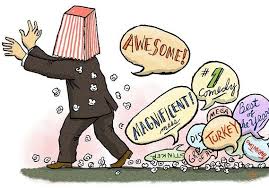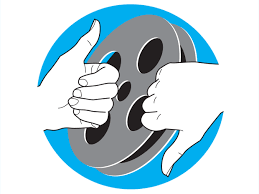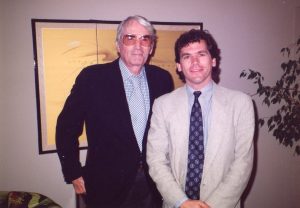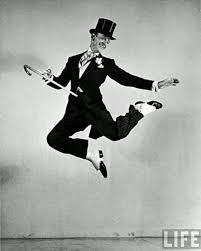
The San Francisco Chronicle building, 5th & Mission, San Francisco.
I never asked to be a movie critic. And yet it happened. People don’t believe me when I say this; they assume movie reviewing is such a plum job that I must have scrambled and hustled to get there. Not really.
In 1991 I’d been working at the San Francisco Chronicle seven years when the senior movie critic Judy Stone took a buyout offer and retired. In a crisp email, the assistant managing editor informed me I would forthwith be reporting full-time as a movie critic. There wasn’t any “Come in to my office to discuss…” conversation. No “How would you feel about doing this…?”
I was the logical choice, given that I’d been pinch-hitting for Judy when she was out sick or on vacation. Plus, I’d previously reviewed films for the San Francisco Bay Guardian, an alternative weekly. That job also came unbidden: I got it because my neighbor at the time was the arts editor and had a hunch I could do it.
Even though I had a lifelong love of movies, and a deep trove of cinema trivia in my head, I never thought I’d be a critic. I figured my take on movies was too idiosyncratic, too personal and off-the-mainstream. I later realized that every film critic is idiosyncratic — that taste and aesthetics are by definition deeply personal. If a critic writes safe, generalized pabulum that doesn’t spring from a strongly impassioned point of view, then you’ve got a problem.
For the next 12 years I reviewed movies full-time in addition to writing features and profiles on movie personalities. I saw between 200 and 250 movies per year, and wrote up to five reviews and feature stories per week. I got to meet Catherine Deneuve, Lillian Gish, Stephen Spielberg, Lucille Ball, Gregory Peck, Pedro Almodovar, Clint Eastwood, Laura Dern and hundreds more. I went to film festivals in Toronto, Sundance, Telluride, and Hong Kong. I had the privilege of championing artists like Krzysztof Kieslowski and Satyajit Ray, whose work might otherwise go unnoticed because their distributors had tiny advertising budgets; and I got to discover Oscar-winning filmmakers like Alexander Payne (Sideways, The Descendants) and Steven Soderbergh (sex, lies, and videtape; Erin Brockovich) as their careers were just starting.
Being a movie critic brought me a minor level of fame in the Chronicle’s circulation area — at least among the people who read movie reviews — and a feel for the privileges and annoyances of being a public person. I was gratified when someone said, “You’re my favorite critic” or “I saw that movie you recommended and loved it.” It was fun to see my name quoted in a movie trailer, and then hear from a cousin back East or an old college friend who also saw the trailer. Who doesn’t like an ego boost? I enjoyed the dialogue with readers and the fringe benefits — like getting choice seats and not waiting in long lines; like getting comped for concerts and plays; like having my phone calls answered quickly. You can get spoiled that way, and I did.
Being semi-famous wasn’t always fun. When email became the standard communication mode in the early ‘90s, the feedback I received tripled or quadrupled. Some correspondents were kind and thoughtful; a lot were not. I learned that anger, not satisfaction or admiration, is the single greatest incentive when writing to a total stranger. Think about it: How often do you contact your utility company and enthuse, “Wow, the heat feels great on this blustery day. Thank you!”?
 One day a fellow reviewer at the Chronicle asked me, “Are you getting a lot more hate mail now that everyone’s doing email?” I was. “You owe me the $10 I wasted on that piece of crap!” was a grumble I received more than once. Or, “Are you sure you saw the same movie I saw?” Or this lulu: “It is clear in the last analysis that the only thing coursing through the mind and pen of Edward Guthmann is viciousness of the lowest sort.” At least he could string a sentence together.
One day a fellow reviewer at the Chronicle asked me, “Are you getting a lot more hate mail now that everyone’s doing email?” I was. “You owe me the $10 I wasted on that piece of crap!” was a grumble I received more than once. Or, “Are you sure you saw the same movie I saw?” Or this lulu: “It is clear in the last analysis that the only thing coursing through the mind and pen of Edward Guthmann is viciousness of the lowest sort.” At least he could string a sentence together.
One hater used to cut my reviews from the paper, deface them with a large rubber stamp saying “BULLSHIT” and mail them back to me. (He did that with other critics, I learned.) People take movies personally and if you criticize something that touched them or reinforced their identity, they feel you’ve violated their entire being. Occasionally I got nasty phone calls at home — always anonymous. A colleague introduced me to a friend once who said, “I always know I won’t like a movie if you do.” How the hell do you answer that?
 Once you’re semi-famous, you’re fair game. At a preview screening I was photographed kamikaze-style from three feet away by the since-deposed editor of a San Francisco literary journal. He hated something I’d written. “You might ask first before you photograph someone,” I said. “Ohhh, would the Chronicle?” he sneered. The next day, he posted the photo online and claimed I “lashed out” at him when he took the picture.
Once you’re semi-famous, you’re fair game. At a preview screening I was photographed kamikaze-style from three feet away by the since-deposed editor of a San Francisco literary journal. He hated something I’d written. “You might ask first before you photograph someone,” I said. “Ohhh, would the Chronicle?” he sneered. The next day, he posted the photo online and claimed I “lashed out” at him when he took the picture.
In October 2003 I wrote my last review, asked to be reassigned, and started writing author interviews and a variety of profiles. I bailed because my assignment editor was intolerable (a very long story), but as soon as I quit I realized how much I’d come to dislike the reviewer grind itself. Had the movies all been stellar, I might not have minded, but many were awful — and often in the same way that movies from the previous week were awful. I sometimes felt like I was justifying the stinkers by giving them any attention at all.
Suddenly my evenings were free. Slowly, I could recapture the original love of movies I developed as a 7-year-old watching Fred Astaire and The Wizard of Oz on TV. In that first year after quitting, I saw only one or two movies a month instead of four or five a week I didn’t have to sit through soul-destroying bilge to the bitter end. I only saw the movies I wanted to see, and if I was bored I got up and walked out. I was liberated! Like a frog in a pot of water that slowly comes to a boil, I hadn’t realized how accustomed I’d become to stress, discomfort and a begrudging sense of duty.
At the same time, I knew I was surrendering a kind of cachet and name recognition, that I would miss the communication with my readers and the cushy, glamorous aspects of the job. I felt a pang of regret that my 12-year-old nephew, who liked having a movie critic for an uncle, would lose his bragging rights and be disappointed for himself and for me. But I don’t regret my decision: I regained an ease and comfort in my life.
Most of the writing I do now is personal, and my relationship with movies has never been better. During Covid, I watched Turner Classic Movies and streamed new titles regularly. I found that old favorites have a new dimension, a new fascination. Having lived more, I appreciate them on different and deeper levels. I’m falling in love all over again.





Wow Edward, fascinating!
This movie lover always thought you movie critics had plum jobs , but despite your big reveal it still sounds pretty plum – but maybe with some pits!
Thank you, Dana.
So glad you told this story here! As a faithful reader from your days at the Chron, I appreciate reading about the ups and downs of a job that sounds like a dream but has a few nightmarish aspects as well. And how wonderful to read about all the interesting people you got to meet during those years. More of this,please. Excellent piece!
Thanks a lot, Risa!
Love this story, Edward! I always wanted to be a film or theatre critic, but you have shown me that there are down sides as well as ups. Still, I’m glad you did it (I used to read your reviews in the Chronicle), and I’m especially glad that you wrote about it here!
Thanks, Suzy. Happy Birthday one day late!
I love the contrast of your being semi-famous and then returning to a relative state on anonymity, Edward. Some of the perks seem great, but that hate email must have been annoying. Great and rare perspective on fame.
Thanks, Marian. Yes, the contrast was dramatic. I miss a lot about that life — who wouldn’t be thrilled to meet some of the people I met? — but I’m grateful for anonymity and quiet.
What a fascinating story about a career I’ve often wondered about…thanks for taking us behind the scenes!
Thanks, Barbara!
I really enjoyed your story of your days as a film critic. Because you were “almost famous” for a period of time, it feels like you treasure being out of that spotlight. Glad you are enjoying your retirement & movies once again.
Thank you, Laurie.
Thanks for this “insider’s” view of the biz, Edward. We see a LOT of movies in our household too (as you may have gathered from my comment to your earlier story). We’ve gone to the Santa Barbara Film Festival twice, regularly attend the Nantucket Film Festival (quite good, they get many of their films from Sundance), we have a not-spectacular festival here on the Vineyard (we did see “Parasite” ahead of anyone last year). We try to see anything with an Oscar nod. And these days my husband records tons of stuff off TCM and watches all the time. I read Ty Burr in the Boston Globe religiously, but I have learned to take him with a grain of salt. I would NEVER write to him.
My husband and I are still arguing about the Best Picture of 1999; I LOVE “Shakespeare in Love”, he thinks “Saving Private Ryan” was a much better film.
But I think “Romeo and Juliet” is the greatest piece of English lit around, so that’s my predilection.
Yet, it is difficult for me to imagine seeing SO many films and writing a critique on deadline. That would take the joy out viewing them. And the nastiness you describe has risen enormously due to the Internet (even more with social media. Twitter is a swamp). I am sure you miss some of the perks, but are well out of the worst of it. Thank you for sharing this very interesting insider’s point of view. But it truly must have been thrilling to meet so many great actors and have a chance to talk with them. That is rare air, indeed.
Thanks for writing, Betsy. Glad to know you and your husband are both major film fans. The Nantucket festival sounds great. Sorry, but I have to vote for “Saving Private Ryan.”
I will tell my husband that you’ve weighed in (of course, I’ll never hear the end of it, but I don’t anyway). I’m sure he’ll be happy to have a pro on his side. (-:
As another former reader who misses your reviews, I’m glad to hear the story from the reviewer’s point of view. I actually had a similar experience as “cultural affairs director” of my college radio station, which meant that I procured tickets not just to movies but to plays, concerts, and other cultural events in Cambridge and Boston, and assigned reviewers. I know what you mean about the pressure of writing reviews on deadline, which for me often meant pounding away at the station’s old typewriter and airing the review live on our news broadcast THAT NIGHT! I was known as overly generous and I must admit that assessment was correct, although In fairness I generally assigned myself the best events to review! Thanks for taking me back to those memories and for your decades of informative reviews.
Thanks very much for your kind words, John.